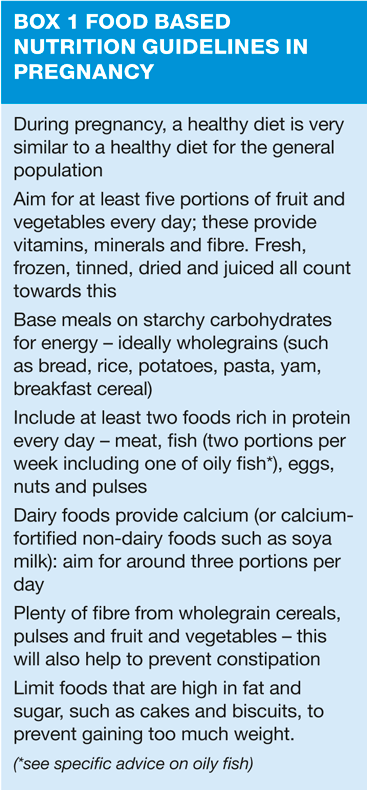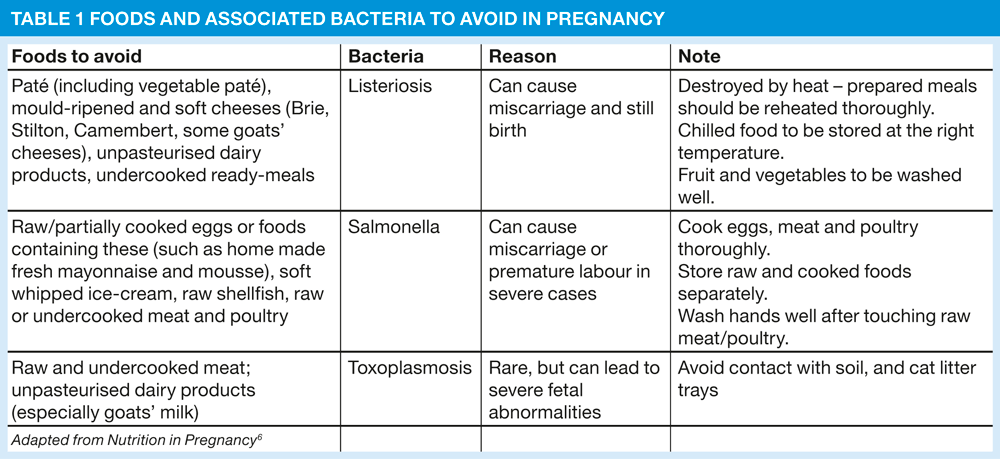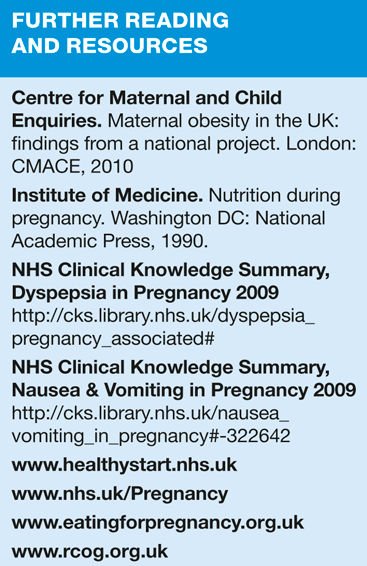Healthy eating in pregnancy and before
Dr Frankie Phillips
Dr Frankie Phillips
RD RPHNutr
Independent registered dietitian, Torquay
Nutrition plays a vital role in pregnancy, and routine appointments give practice nurses opportunities to offer valuable advice to women both during pregnancy and before they conceive. But what constitutes a healthy diet during pre-conception and pregnancy?
Nutrition is a major area of concern for pregnant women; however, the subject can be confusing as, with constantly emerging scientific evidence, advice always seems to be changing, and messages are often conflicting. However, pregnant women value the advice they receive from practice nurses as authoritative and independent. It is essential, therefore, that healthcare professionals are up to date with the latest advice and resources to reassure and direct their patients appropriately.
PRE-CONCEPTION
Making the decision to start a family is a life-changing step, and a woman's health leading up to conception can also have an impact on the health of the child. Nutrition is an important factor in this. Simple lifestyle changes may increase the chances of conception and help to ensure a healthy pregnancy. Of course, there are some factors (age, ovulation problems, sperm disorders and damaged fallopian tubes) that nutrition and lifestyle measures can't change.
Body Mass Index
Both high and low body fat levels are related to infertility and altered hormone levels; a critical mass of body fat determines the onset of periods and regulates gonadotropin secretion.
In the UK, up to 50 per cent of women of childbearing age are overweight (Body Mass Index (BMI) above 25); of these 18 per cent are morbidly obese.1 Men and women who are obese may find it more difficult to conceive and women who are obese run the risk of miscarriage and above average pregnancy related complications. A wealth of studies2 have shown that maternal overweight and obesity are associated with hypertension, macrosomia, gestational diabetes and an increased likelihood of delivery by caesarean section.
Conversely, being underweight (low BMI) has also been shown to make conception more difficult.3 Excessive dieting and eating disorders can also affect fertility.
Being a healthy weight (BMI of 19-24 inclusive) during the periconceptual period is critical in achieving and ensuring a viable pregnancy. It is also, therefore, an opportunity to raise the issue of healthy weight and weight gain with female patients.
Folic acid
Folic acid supplements (400mcg per day) are advised for all women who are planning a pregnancy, and should be recommended for patients who present for advice to stop contraception in preparation for pregnancy. These should be taken daily until the 12th week of pregnancy to prevent risk of neural tube defects (NTD) such as spina bifida. Women at higher risk, such as those who have had a previous NTD-affected pregnancy, those with diabetes or who take drugs for epilepsy, should take a 5mg dose which is only available on prescription. The NHS Healthy Start vitamin supplements for pregnant women contain vitamins D and C and folic acid, and are specially formulated for women trying to conceive, as well as for pregnant and breastfeeding women. These are free for many women in receipt of benefits, but some areas have a policy to provide them free to all pregnant women.
Male fertility
Male fertility can also be influenced by nutrition and lifestyle, and eating a healthy diet and being the right body weight are equally important for men. Studies of specific nutrients such as zinc and selenium and male sperm quality have not provided conclusive evidence,4 but the key messages for men are: aim to be a healthy weight by eating sensibly and exercising on a regular basis; eat a variety of foods to help ensure adequate amounts of nutrients such as zinc, selenium, folate and vitamin C; and drink alcohol moderately: three to four units of alcohol a day is the UK maximum recommended for men.
DURING PREGNANCY
Ironically, the earliest weeks of pregnancy are a stage that is often completely missed because a woman may not even realise that she is pregnant; however it is probably the most crucial time in terms of nutrition.
Studies have established that good nutrition is vitally important during pregnancy, and work by Barker5 hypothesised that malnutrition during critical periods of fetal growth can permanently impair physiology and metabolism. In particular, the first trimester is a critical time of development; if a good diet is eaten in the first trimester, this will stand the woman in good stead to continue to eat healthily post pregnancy. Women are often motivated to develop healthier habits during pregnancy for the wellbeing of their unborn child and this can be an opportunity to improve their diet in the longer term (see Box 1 for guidance on what constitutes a healthy diet).
Iron
During pregnancy, iron requirements increase to meet the demands of increased red blood cells, the growing fetus and placenta. There is no recommendation to increase dietary iron intake, since the cessation of menstruation and increased intestinal absorption of iron meet the extra iron requirement. However, many women have low iron stores before becoming pregnant and are at increased risk of iron-deficiency anaemia.6 Good, food-based sources of iron include: red meat, pulses, wholegrain bread, dark green leafy vegetables and fortified breakfast cereals. Consuming vitamin C-rich foods or fruit juice along with any iron-rich foods can also enhance iron absorption. Iron supplements may be used where haemoglobin levels are persistently low.
Calcium
Physiological adaptations during pregnancy mean there is no recommendation to increase calcium intake. However, adolescent girls who become pregnant should ensure that adequate amounts of calcium rich foods are included to meet the demands of pregnancy in addition to their own physiological needs for growth and development. Added calcium supplements are advisable for young women under 25 years, to enable the healthy growth of bone, which continues to this age.
Vitamins C and D
An increase of 10mg of vitamin C is needed during the last trimester of pregnancy. In addition, vitamin C-rich foods (such as orange juice) can help to increase absorption of iron from the diet if consumed at the same time as iron-containing foods.
During pregnancy, 10mcg of vitamin D daily is recommended. Vitamin D is found in small amounts in a few foods, including oily fish, eggs and fortified breakfast cereal. Most of the body's requirement for vitamin D is met by the action of sunlight on bare skin, but the body's stores can be low during late winter and early spring. Women of Asian origin and those who cover up all or most of their skin are particularly at risk of having low levels of vitamin D.6
Both vitamins C and D are included in the Healthy Start vitamin supplements for women at the required levels.
Weight gain and obesity
Eating for two is simply not an accurate reflection of current nutrition advice during pregnancy. Only an additional 200 calories per day are actually required during the last trimester of pregnancy. In practical terms, a woman should be advised to eat a healthy diet according to her appetite.
The amount of weight a woman may gain in pregnancy can vary a great deal. Only some of it is due to increased body fat - with most of the weight gain being accounted for by the unborn child, placenta, amniotic fluid and increases in maternal blood and fluid volume.
According to the World Health Organization,7 for women who are a normal pre-pregnancy weight, an average pregnancy weight gain of 12kg (10-14kg) is associated with the lowest risk of complications. If a woman is overweight before becoming pregnant, it is suggested that a 7kg weight gain is appropriate, and women should not attempt to lose weight while they are pregnant.
The prevalence of obesity among women of childbearing age is increasing. In the UK, it is estimated that about 15-20 per cent of pregnant women are obese.8 Obesity has been linked with increased risk of complications in pregnancy, for both mother and baby, including gestational diabetes, venous thromboembolism, hypertension and pre-eclampsia, and obese women are more likely to require a caesarean section. Problems for the baby can include abnormally high birth weight and birth defects. Consequently, NICE guidance on weight management before, during and after pregnancy recommends that health professionals should encourage obese women (those with a BMI of 30 or more) to reduce weight before becoming pregnant.1
Other concerns
- Constipation: Increase high-fibre foods: Eat wholemeal bread, high fibre breakfast cereal and fruit and vegetables daily. Drink plenty of water daily.
- Morning sickness: Eat little and often through the day. Choose mainly starchy foods such as toast, crackers. Drink fluids little and often through the day to prevent dehydration. Cold, bland, non-greasy foods are often better tolerated. Avoid the smell of cooking. Ginger-rich foods or drinks sometimes help.
- Heartburn: Eating small regular meals and snacks and avoiding large meals can help with symptoms. Avoid fatty, fried and spicy foods. Avoid eating within three hours before going to bed.
FOOD SAFETY IN PREGNANCY
General advice on food safety issues is based on basic hygiene practice when preparing foods, especially raw meat. However, in addition, pregnant women need to avoid certain bacteria that are potentially harmful during pregnancy.
Advice regarding food safety can change slightly, based on evidence and guidelines: current advice on foods to avoid during pregnancy is shown in Table 1.
Fish and shellfish
Fish is an excellent source of protein, vitamins and minerals. However, some types of fish, including marlin, shark and swordfish can have a high mercury content, which can cause neurological damage in the fetus. Tuna can be eaten safely at low levels: no more than two fresh tuna steaks (170g raw) or four medium cans (140g) of tuna per week. No more than two portions of oily fish should be consumed per week.
Raw shellfish should also be avoided owing to the risk of potential bacterial contamination, but well-cooked shellfish, such as prawns, can be eaten safely.
Liver products and vitamin A
High intakes of vitamin A during pregnancy have been found to be teratogenic. Being high in vitamin A, all liver products (including pat'es and faggots) should be avoided during pregnancy. Many vitamin supplements and fish liver oils, which are not formulated for pregnant women, may also contain too much vitamin A. Healthy Start vitamins for pregnant women do not contain vitamin A.
Caffeine
Studies suggest that caffeine may be included during pregnancy but should be limited to no more than 200mg per day to reduce the risk of miscarriage or low birth weight.9
The following list shows typical amounts of caffeine per portion:
1 mug instant coffee - 100mg
1 mug of brewed coffee - 140mg
1 mug of tea - 75mg
1 can of cola - up to 40mg
1 can of 'energy' drink - up to 80mg
1 small (50g) bar of plain chocolate - up to 50 mg
Caffeine in milk chocolate is about half that of plain chocolate.
Some cold and flu remedies also contain caffeine.
Alcohol
The Department of Health recommends that alcohol should be avoided completely during pregnancy as there is no recognised safe limit. However, according to the Royal College of Obstetricians and Gynaecologists, while abstinence from drinking alcohol during pregnancy is the safest choice, for women who do drink they should have no more than one or two units, not more than once or twice per week.10
Nuts
Current evidence suggests that pregnant women can continue to eat nuts, including peanuts and peanut butter, as part of their balanced diet, unless allergic to them. Previous government advice suggested that women should avoid eating peanuts during pregnancy if there was any history of allergy in a first-degree relative, but new research shows that there is no clear evidence that eating peanuts during pregnancy affects the baby.
CONCLUSION
Routine visits to discuss contraception and other 'well woman' issues give practice nurses not only a valuable opportunity to discuss sexual health with women, but may also be a first step in discussing a pregnancy, planned or otherwise. Since nutrition plays a vital role in any healthy pregnancy, it's a golden opportunity to give advice about good nutrition to ensure a safe and healthy pregnancy.
REFERENCES
1. NICE. Dietary interventions and physical activity interventions for weight management before, during and after pregnancy. NICE Public health guidance 27. London: National Institute for Health and Clinical Excellence, 2010.
2. American Dietetic Association. Position of the ADA and the American Society for Nutrition: obesity, reproduction and pregnancy outcomes. J Am Diet Assoc 2009;109(5):918-927.
3. Correa H and Jacoby J. Nutrition and fertility: some iconoclastic results. Am J Clin Nutr 1978; 31:1431-1436.
4, Hawkes WC and Turek PJ. Effects of dietary selenium on sperm motility in healthy men. J Androl 2001;22(5):764-772.
5. Barker D. Fetal and infant origins of adult disease. London: BMJ Publishing Group, 1992
6. British Nutrition Foundation. Nutrition in pregnancy, Oxford: Blackwell Science, 2006.
7. World Health Organization. Maternal Anthropometry and pregnancy outcomes: A WHO Collaborative Study. WHO Bulletin 1995;73(Suppl): 1-98.
8. Heslehurst N, Ellis LJ, Simpson H et al (2007). 'Trends in maternal obesity incidence rates, demographic predictors, and health inequalities in 36,821 women over a 15-year period'. International Journal of Obstetrics and Gynaecology 2007;114(2):187-194.
9. NHS Choices. Eating well for pregnancy. Available at www.nhs.uk/Livewell/pregnancy/Pages/healthyeating.aspx
10. RCOG Alcohol and pregnancy: information for you, guideline. London: RCOG, 2006
Related articles
View all Articles


